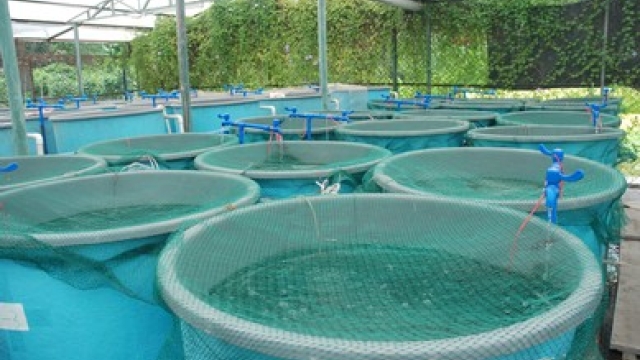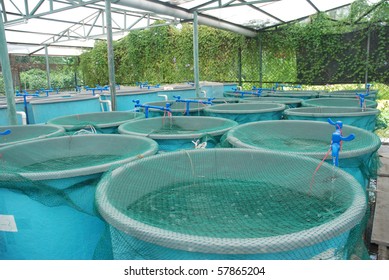
Revolutionizing the Waters: Innovations in Aquaculture Technology
- by Jose Bryant

The world of aquaculture is undergoing a transformative revolution, driven by innovative technologies that promise to enhance sustainability and efficiency in fish farming. As the global demand for seafood continues to rise, the aquaculture sector is stepping up to meet these challenges with groundbreaking tools and practices. Whether it’s advanced monitoring systems, automated feeding techniques, or sustainable breeding programs, the advancements in this field are redefining how we produce aquatic food.
At the forefront of this revolution is The Rokter, an authoritative hub for aquaculture technology and sustainability insights. Here, aquaculture professionals can explore in-depth blog posts and access a wealth of industry resources that share the latest trends and developments. The dedicated forum fosters collaboration and knowledge exchange, allowing experts and enthusiasts alike to engage in meaningful discussions that will shape the future of aquaculture.
Emerging Technologies in Aquaculture
The aquaculture industry is experiencing a transformative wave of innovation, driven by the need for sustainable practices and increased efficiency. Advanced technologies such as artificial intelligence and machine learning are now being utilized to optimize fish feeding, monitor water quality, and predict disease outbreaks. By analyzing vast amounts of data, these technologies enable farmers to make informed decisions, resulting in healthier stocks and reduced environmental impact.
Salmon health management
Another noteworthy advancement is the implementation of biofloc technology, which promotes the growth of beneficial microorganisms in the water. This approach not only reduces the need for external feed but also enhances water quality by recycling nutrients. By integrating biofloc systems into traditional farming, producers can increase productivity while minimizing waste and pollution, aligning with sustainability goals.
Furthermore, the use of automation and robotics in aquaculture is gaining momentum. Automated feeding systems, drones for aerial inspections, and underwater robots for habitat monitoring are becoming commonplace. These innovations reduce labor costs and improve operational efficiency, allowing aquaculture professionals to focus on strategic planning and sustainable practices. Collectively, these emerging technologies are setting the stage for a new era in aquaculture, ensuring it meets the demands of a growing global population.
Sustainable Practices for the Future
As the demand for seafood continues to rise, sustainable aquaculture practices are becoming increasingly vital. Innovations in technology are enabling fish farms to minimize their environmental footprint while maximizing productivity. Techniques such as recirculating aquaculture systems (RAS) allow for the efficient use of water and feed, reducing waste and promoting a healthier ecosystem. This closed-loop system is not only beneficial for the environment but also enhances fish health and quality, leading to a more sustainable product that meets consumer expectations.
In addition to RAS, integrated multi-trophic aquaculture (IMTA) is gaining traction as a holistic approach to sustainability. IMTA involves farming different species together in a way that mimics natural ecosystems. By pairing species with complementary feeding habits, waste from one species can be utilized as food for another. This innovative method improves resource efficiency and creates a symbiotic environment that can lead to increased biodiversity. The Rokter emphasizes the importance of such practices, providing insights into the methods and successes of farmers who adopt IMTA in their operations.
Furthermore, advancements in monitoring technology are enhancing the ability of aquaculture professionals to implement sustainable practices. Tools such as IoT sensors and AI-driven data analysis allow for real-time monitoring of water quality, fish health, and feeding patterns. By utilizing these technologies, farmers can make informed decisions that optimize their operations and reduce negative environmental impacts. The Rokter not only showcases these innovations but also serves as a hub for knowledge sharing among aquaculture professionals, encouraging the adoption of best practices in sustainability for a more promising future.
Market Trends and Insights
The aquaculture industry has been experiencing significant growth in recent years, driven by an increasing global demand for seafood. As populations rise and dietary preferences shift towards healthier protein sources, aquaculture provides a sustainable alternative to wild fishing. According to recent reports, global aquaculture production is projected to continue its upward trend, offering a promising landscape for innovation and investment.
Technological advancements are reshaping aquaculture practices, enabling more efficient production methods and better resource management. Innovations such as automated feeding systems, water quality monitoring technologies, and fish health management solutions are becoming essential tools for aquaculture professionals. These technologies not only improve productivity but also enhance sustainability by minimizing waste and optimizing resource use, aligning with the industry’s growing focus on environmental responsibility.
Moreover, there is a noticeable shift towards the integration of data analytics and artificial intelligence in aquaculture operations. By leveraging big data, companies can make informed decisions based on real-time insights that enhance operational efficiency and sustainability. As the industry evolves, staying informed on these market trends and technological innovations is crucial for professionals seeking to remain competitive and contribute to the future of sustainable aquaculture.
Case Studies of Innovation
One of the most compelling case studies in aquaculture technology is the implementation of integrated multi-trophic aquaculture (IMTA) systems. This innovative approach allows different species to coexist and thrive in a shared environment. By cultivating shellfish, seaweed, and fish simultaneously, IMTA enhances nutrient cycling and reduces waste. The Mediterranean region has seen significant success with IMTA, leading to improved ecosystem health and increased profitability for farmers. These systems not only foster sustainable practices but also provide local communities with diverse seafood options.
Another notable advancement comes from the use of smart farming technologies, which incorporate IoT devices and data analytics. A leading example is the use of underwater drones to monitor fish health and water conditions in real time. This technology enables farmers to make proactive decisions regarding feeding, breeding, and disease management. A case study from Norway illustrates how a fish farm adopted drone technology to improve operational efficiency and reduce costs, resulting in a substantial increase in fish yield and quality. This smart approach transforms traditional practices and enhances sustainability in aquaculture.
Finally, advancements in breeding programs using genetic technologies have significantly impacted aquaculture productivity. For instance, a research facility in the United States successfully developed disease-resistant strains of shrimp through selective breeding. This innovation has led to substantial declines in mortality rates due to disease outbreaks in shrimp farms. The benefits of such genetic improvements are not only enhanced production but also reduced reliance on antibiotics, contributing to a more sustainable aquaculture industry. These innovative breeding practices are paving the way for a future where aquaculture is both efficient and environmentally responsible.
Community Engagement and Resources
The Rokter serves as an essential platform for aquaculture professionals, fostering a vibrant community dedicated to sharing knowledge and experiences. By connecting industry leaders, researchers, and practitioners, The Rokter promotes collaboration and innovation within the aquaculture sector. This strong community engagement enables members to stay informed about the latest trends, challenges, and breakthroughs in aquaculture technology, facilitating a collective pursuit of sustainable practices.
In addition to community interaction, The Rokter provides a wealth of resources tailored to the needs of aquaculture practitioners. In-depth blog posts cover a wide range of topics, from best practices in fish farming to the latest technological advancements. Industry resources, including whitepapers, case studies, and guidelines, are readily accessible, empowering aquaculture professionals to make informed decisions that enhance both productivity and sustainability in their operations.
Furthermore, The Rokter hosts a dedicated forum where members can engage in meaningful discussions, ask questions, and share insights. This forum acts as a dynamic space for problem-solving and peer support, ensuring that aquaculture professionals have a supportive network to turn to as they navigate the complexities of the industry. By fostering this community-driven environment, The Rokter not only advances aquaculture technology but also champions a sustainable future for the industry.
The world of aquaculture is undergoing a transformative revolution, driven by innovative technologies that promise to enhance sustainability and efficiency in fish farming. As the global demand for seafood continues to rise, the aquaculture sector is stepping up to meet these challenges with groundbreaking tools and practices. Whether it’s advanced monitoring systems, automated feeding techniques,…